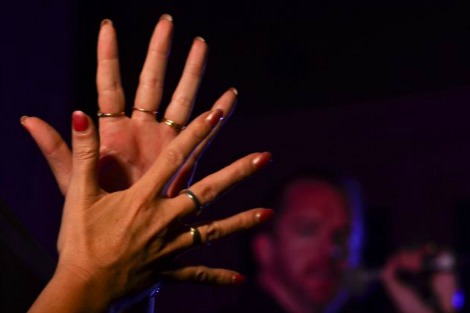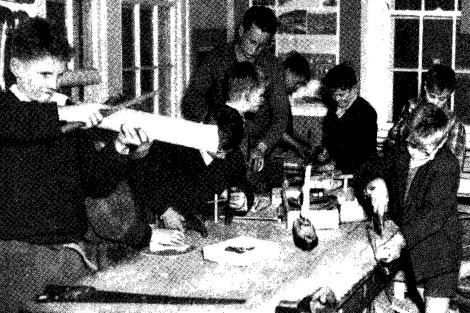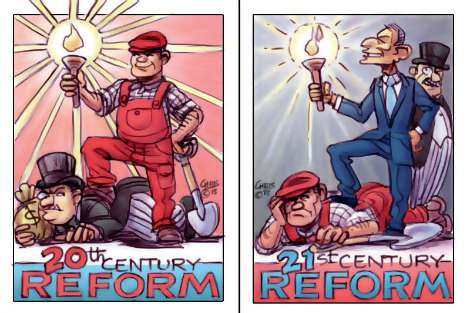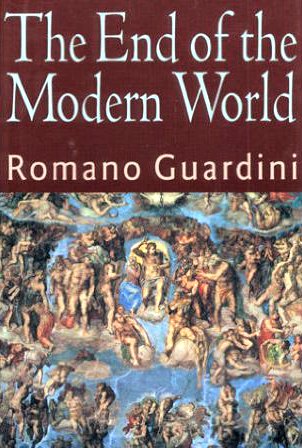Keywords: Progressive
There are more than 200 results, only the first 200 are displayed here.
-

INTERNATIONAL
- J. R. Hennessy
- 19 February 2016
24 Comments
The aftershocks of the late-century push for liberalisation and the GFC have bred generations of dislocated voters who seek answers outside of the limited solutions of centrist governance. This provides ample opportunity for true progressive change, as seen in Europe and Latin America, and now the US and UK. Where's Australia? Nowhere to be seen. It is hard to imagine a truly progressive candidate emerging from our ossified political structures. There are a few reasons for this.
READ MORE 
-

INTERNATIONAL
- Jim McDermott
- 08 February 2016
5 Comments
Many Americans want a President who speaks to their deepest dreams and ideals. A champion. Trump's vision of reality is the polar opposite of Obama's, a hellscape where foreigners, the unemployed (and women) are eroding society. But, like Obama, he has positioned himself as a champion of those filled with frustration, insisting it doesn't have to be this way. Bernie Sanders is in many ways the Trump of the left, a political outsider who says what progressive Americans have long been thinking.
READ MORE 
-

EDUCATION
- Sarah Klenbort
- 20 January 2016
18 Comments
Six years ago my daughter, Kaitlyn, was diagnosed with progressive hearing loss. I was told by an early intervention centre not to sign with her. 'It may interfere with her spoken language development,' they said, though there's no research to support this claim. When she was three, I went against that advice and began studying Auslan. I enrolled my daughter in the bilingual preschool and she learned to sign better than me. She may well be part of the last generation of deaf children to sign in Australia.
READ MORE 
-

AUSTRALIA
- Tom Keating
- 17 November 2015
2 Comments
The case studies given during the Royal Commission's dealings with Victoria's state run institutions were heartrending for anyone like myself who worked within that system in the 1960s and '70s. It must have been harder still for those who were trying desperately to reform the system at that time. By the mid-'80s Victoria came to have the most progressive and effective juvenile justice system in the country and was a leader internationally. Much has been lost in the intervening years.
READ MORE 
-

AUSTRALIA
- Jim McDermott
- 22 September 2015
3 Comments
US presidential hopeful Hillary Clinton is not just an astonishingly brilliant candidate; she is the wife of President Bill Clinton, who flamed out spectacularly in the late 1990s over revelations that he was having an affair with an intern. He has been mostly nowhere to be seen so far in the campaign, and that's undoubtedly an intentional move meant to keep that complicated, messy past out of the conversation. The past haunts Australian Opposition Leader Bill Shorten in a different but no less significant way.
READ MORE 
-

AUSTRALIA
- Jeff Sparrow
- 08 September 2015
5 Comments
The recent National Reform Summit was lauded as an attempt to 'rediscover the art of reform that in the past generation helped to drive high living standards and made Australia the envy among smart nations'. Yet the urgency with which Australian pundits demand 'reform' corresponds with a peculiar opacity about what the term actually means, with its past association with the socialist movement but more recent appropriation as a neoliberal mantra.
READ MORE 
-

AUSTRALIA
- Binoy Kampmark
- 25 August 2015
14 Comments
The spectacle is a strange one. Heydon has to rule on an application that directly concerns his own fitness to be in the position. It recalls the situation Lord Hoffmann found himself in after his links with Amnesty International perceptibly compromised his views on extraditing Chile's former military ruler Augusto Pinochet. Even the best jurists can fall foul of the bias rule.
READ MORE 
-

ARTS AND CULTURE
- Tim Kroenert
- 20 August 2015
25 Comments
Timothy Conigrave's memoir Holding the Man is a classic of contemporary Australian queer literature. Originally published in 1995 a few months after Conigrave's death from AIDS, it is an account of his relationship with John Caleo, whom he met in 1976 when they were both students at the Melbourne Jesuit private boys school Xavier College. Conigrave and Caleo were together for 15 years until Caleo's death (also from AIDS) in 1992. This film adaptation of their story is nothing if not bold.
READ MORE 
-

RELIGION
- Paul Collins
- 15 July 2015
9 Comments
While Francis has no time for technological solutions and 'fixes' for complex ecological problems, he is no techo-Luddite. What he does is link technological knowledge to power and says that those with this knowledge and the economic resources to use it, gain 'an impressive dominance over the whole of humanity and the entire world.'
READ MORE 
-

- Thomas O'Brien
- 08 July 2015
5 Comments
Since the 1950s, the Western World has been experiencing an upheaval regarding the place of society's values in sexual relations. The response of many conservatives has been to act as if nothing has changed and that the social mores and social fabric of the 1950s remain.
READ MORE
-

AUSTRALIA
- Moira Rayner
- 05 June 2015
15 Comments
Joan's outstanding quality was her generosity, which gave her interactions great warmth. She remembered names, faces, and the back-stories of her constituents and supporters as well as her opponents. She stayed politically alert on the issues dearest to her heart, notably public and private respect for the unique perspectives of women and girls. I will miss our great, sometimes squabbling relationship.
READ MORE 
-

'We were told to 'believe' that God could perform miracles, but this was a false lead in terms of what we now know about sacred discourse in the holy lands. This literalism was used against other religions to prove the supremacy of Christianity, but ironically it is what turned the majority of Europeans and Australians off religion as education has swept through Western nations in recent times.' David Tacey reflects on faith and belief. Andrew Hamilton replies.
READ MORE